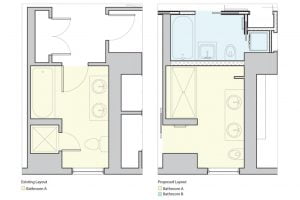The “Wet Over Dry Rule” in NYC
February 17, 2025 by nestapple_admin
Go Back To Previous Page
The wet-over-dry rule in NYC prevents apartment owners from putting wet spaces (bathrooms & kitchens) over dry areas such as living rooms on floors below. The rule prevents water damage and mitigates risks when leaks do occur. The wet over dry rule in NYC is not a law, code, or regulation. However, it is just a rule that most condos and co-ops follow and respect in their alteration agreements. Most renovations can be executed with board approval, but when moving the plumbing, you must find creative ways to get the green light. Once you start changing the pipe, and it becomes unique and specific to each apartment, it becomes challenging to determine where underlying issues might be.
floors below. The rule prevents water damage and mitigates risks when leaks do occur. The wet over dry rule in NYC is not a law, code, or regulation. However, it is just a rule that most condos and co-ops follow and respect in their alteration agreements. Most renovations can be executed with board approval, but when moving the plumbing, you must find creative ways to get the green light. Once you start changing the pipe, and it becomes unique and specific to each apartment, it becomes challenging to determine where underlying issues might be.
Combining two apartments is popular in New York. However, one reason these projects can end up with funky footprints is rules like wet over dry. You can circumvent the Board’s wet-over-dry rules by expanding the kitchen and putting the dishwasher within the footprint of the old bathroom.
Is the wet over dry rule a regulation or law?
Neither. This rule is not a law nor a city regulation. The wet over dry rule in NYC is a rule most condo and co-op buildings follow. They diligently respect that rule in their alteration agreements.
condo and co-op buildings follow. They diligently respect that rule in their alteration agreements.
This rule prohibits putting wet spaces over dry areas on the floors below.
In other words, homeowners renovating their apartments are not allowed to change their layout so that areas that require plumbing are directly over dry areas that don’t use the water lines on the floors below. For example, you can’t have your bathroom directly over your neighbor’s living room. This reduces the risk of damage in case of a leak and prevents mold.
Most buildings in NYC have a wet-over-dry rule in place. However, building a wet space over a dry area is legal if your building allows it. You should always browse your building’s alteration agreement to confirm their approval. For example, some buildings, such as closets or hallways, might be exempt if the dry space is not habitable.
Where does the wet over dry rule come from?
Architect Elliot Glass was the first to develop the wet-over-dry rule.  He became known for being stricter than NYC’s Department of Buildings, and the laws he once instituted in New York are now almost universally seen and followed in alteration agreements.
He became known for being stricter than NYC’s Department of Buildings, and the laws he once instituted in New York are now almost universally seen and followed in alteration agreements.
Why do management companies enforce the wet over dry rule?
The boards of Co-Ops and condos require owners to follow the wet over dry rule to minimize the risks of water damage. This also reduces the cost of water damage to the floors below if a leak occurs. As a result, in most buildings in New York, all the apartment lines will have the same floor plan.
cost of water damage to the floors below if a leak occurs. As a result, in most buildings in New York, all the apartment lines will have the same floor plan.
For example, 9A will have the same layout as 10A. The property manager enforces this wet-over-dry rule through the alteration agreement. This is a document that owners and contractors sign before starting any work on their unit.
From an insurance standpoint, it is sometimes hard to prove which party is liable for water damage. Insurance companies might not fully cover costs for the building or individual apartment owners.
Less risk in wet over wet buildings
Apartments of the same line are frequently built on top of each other in identical layouts. This helps each building line on top of each other. Consequently, water leaks will generate less damage if they spill over a wet zone. Indeed, most bathrooms will be tiled areas with drainage and more water-resistant than a living room with hard floors.
Can an apartment buyer get approved for an exception to the wet-over-dry rule before purchasing?
No. A buyer should not sign a contract assuming the Board pre-approves the renovation plans. This has nothing to do with the  wet-over-dry rule. Co-op and condo board members volunteer their time for the benefit of the current owners, not to make prospective buyers happy.
wet-over-dry rule. Co-op and condo board members volunteer their time for the benefit of the current owners, not to make prospective buyers happy.
It is too risky to ask a co-op board for such an exception. Indeed, coop board meetings have the right to approve any potential buyers. In other words, Coop. The Board can reject any purchaser for any reason.
Coop boards do not have to disclose the reason for their choice. In fact, they never do so for liability reasons.
A co-op board interview tests a buyer’s qualifications. It’s also the opportunity to ask all the uncomfortable questions. If the co-op board thinks a given buyer is a troublemaker, the Board may reject that buyer.
How to convince a Coop. Board to grant an exception regarding the Wet over dry rule
Most management companies advise boards that authorizing wet-over-dry construction is an unnecessary risk. However, some boards decide that it’s a risk worth taking with the proper mitigants. Some management company advisory boards include a policy in the alteration agreement that should be reviewed and updated annually.
1) Demonstrate strong waterproofing measures
Boards and Management companies are hesitant to approve exceptions to the wet-over-dry rule. However, they sometimes grant special approvals if the renovation includes reliable waterproofing measures and flood alarms. An example is cement-based flooring, such as Wonderboard, in all shower and bathtub areas.
includes reliable waterproofing measures and flood alarms. An example is cement-based flooring, such as Wonderboard, in all shower and bathtub areas.
We also recommend treated paper behind walls and titles. This prevents moisture from entering the walls and floors. We also recommend installing a dishpan to catch water from any potential leaks.
2) Expand the wet area rather than move it
Another suggestion is to ask a Board to expand a wet area rather than move it to a different location. For example, a Board could be flexible in developing a bathroom by transforming a nearby closet into a shower. Or a Board could approve installing a washing machine in a cabinet nearby the kitchen or bathroom.
2) Make sure you insure the building (co-op. or condo) on the policy
Boards will be more flexible in providing an exception to the rule if you add the building to your insurance policy. Indeed, the Board does not want to be in the middle of insurance claims or a lawsuit between neighbors. Some insurance companies won’t allow you to name your co-op or condo as an insured party.
 He became known for being stricter than NYC’s Department of Buildings, and the laws he once instituted in New York are now almost universally seen and followed in alteration agreements.
He became known for being stricter than NYC’s Department of Buildings, and the laws he once instituted in New York are now almost universally seen and followed in alteration agreements. cost of water damage to the floors below if a leak occurs. As a result, in most buildings in New York, all the apartment lines will have the same floor plan.
cost of water damage to the floors below if a leak occurs. As a result, in most buildings in New York, all the apartment lines will have the same floor plan. wet-over-dry rule. Co-op and condo board members volunteer their time for the benefit of the current owners, not to make prospective buyers happy.
wet-over-dry rule. Co-op and condo board members volunteer their time for the benefit of the current owners, not to make prospective buyers happy. includes reliable waterproofing measures and flood alarms. An example is cement-based flooring, such as Wonderboard, in all shower and bathtub areas.
includes reliable waterproofing measures and flood alarms. An example is cement-based flooring, such as Wonderboard, in all shower and bathtub areas.  floors below. The rule prevents water damage and mitigates risks when leaks do occur. The wet over dry rule in NYC is not a law, code, or regulation. However, it is just a rule that most
floors below. The rule prevents water damage and mitigates risks when leaks do occur. The wet over dry rule in NYC is not a law, code, or regulation. However, it is just a rule that most  condo and co-op buildings follow. They diligently respect that rule in their alteration agreements.
condo and co-op buildings follow. They diligently respect that rule in their alteration agreements.

